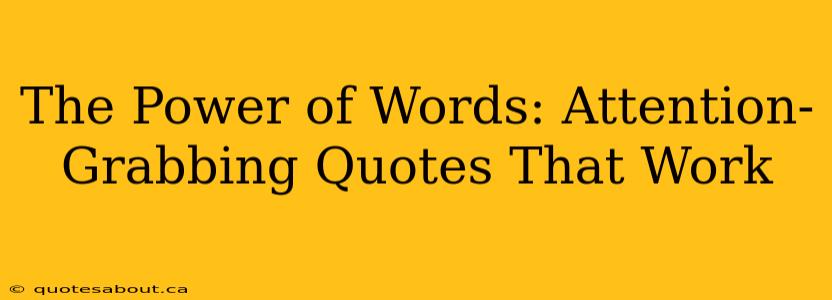Words. They're the building blocks of communication, the foundation of stories, and the driving force behind persuasion. A well-chosen quote can captivate an audience, leaving a lasting impression and driving home a key message. But what makes a quote truly work? It's not just about the words themselves; it's about understanding their context, their impact, and how they resonate with the intended audience. This exploration delves into the art of using attention-grabbing quotes effectively, examining their power in various contexts and providing strategies for selecting and implementing them in your writing or speeches.
What Makes a Quote "Attention-Grabbing"?
An attention-grabbing quote isn't just memorable; it's relevant, impactful, and resonates with the audience's emotions or intellect. Several factors contribute to its effectiveness:
-
Brevity and Clarity: The most potent quotes are concise and easy to understand. Lengthy, convoluted sentences lose their impact. Think of Lincoln's Gettysburg Address – powerful in its brevity.
-
Emotional Resonance: Quotes that evoke strong emotions – joy, sadness, anger, hope – are more likely to stick with the audience. They tap into something deeply personal, forging a connection.
-
Relatability: People are drawn to quotes that reflect their own experiences or beliefs. A relatable quote creates a sense of shared understanding and validation.
-
Originality (or Unexpectedness): While classic quotes hold weight, a unique or unexpected perspective can be equally compelling. A fresh take on a familiar theme can be surprisingly powerful.
-
Contextual Relevance: The best quotes are relevant to the topic at hand. Using a quote about courage in a discussion on leadership makes perfect sense; using one about gardening in the same context... not so much.
How to Choose the Right Quote for Your Purpose
Selecting the perfect quote requires careful consideration of your audience and your message. Ask yourself these questions:
-
Who is your audience? What are their values, interests, and experiences?
-
What is your message? What key point do you want to convey?
-
What tone do you want to set? Formal, informal, serious, humorous?
-
What is the context? Is this a presentation, a blog post, a social media caption?
Where to Find Great Quotes
Finding impactful quotes requires a bit of digging, but there are plenty of resources available:
-
Books and Articles: Exploring books and articles on your topic is a great place to start. Note down quotes that resonate with you.
-
Quotation Websites: Numerous websites are dedicated to compiling quotes, categorized by topic or author.
-
Literary Classics: The works of Shakespeare, Hemingway, Austen, and countless other authors are treasure troves of memorable quotes.
How to Effectively Integrate Quotes into Your Work
Simply dropping a quote into your text isn't enough. You need to integrate it seamlessly and thoughtfully:
-
Introduce the quote: Briefly introduce the quote and its source. This provides context and establishes credibility.
-
Explain the quote's significance: Don't just leave the quote hanging. Explain why it's relevant to your point and how it supports your argument.
-
Use quotation marks correctly: Always use quotation marks (" ") to indicate a direct quote.
-
Cite your sources: Properly cite the source of the quote to avoid plagiarism. This shows respect for the original author and builds your credibility.
What are some examples of attention-grabbing quotes?
This depends heavily on context. However, some universally powerful quotes include:
-
"The only way to do great work is to love what you do." - Steve Jobs: This resonates with those striving for excellence and finding meaning in their work.
-
"The future belongs to those who believe in the beauty of their dreams." - Eleanor Roosevelt: This inspires hope and encourages ambition.
-
"The journey of a thousand miles begins with a single step." - Lao Tzu: This motivates action and emphasizes the importance of taking the first step.
What are some tips for writing attention-grabbing quotes?
While finding existing quotes is crucial, learning to craft your own memorable phrases adds significant impact. Consider these tips:
-
Embrace simplicity and clarity: Avoid jargon and convoluted sentences.
-
Evoke emotion: Tap into universal human experiences.
-
Use strong verbs and vivid imagery: Make your quote memorable and easily visualized.
-
Test and refine: Get feedback on your quotes to ensure they resonate with your intended audience.
By understanding the power of words and thoughtfully selecting and integrating quotes, you can significantly enhance your communication and leave a lasting impression on your audience. The art lies in finding the perfect words to express your message powerfully and memorably.

